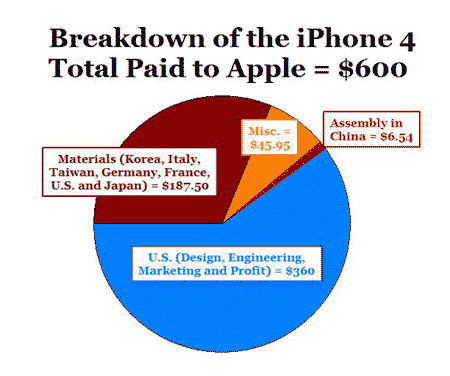
Turn over your iPhone and you’ll see that it’s “assembled in China.” But that doesn’t mean that most of the profits or revenue go there. In fact, only about $6.54 (a little more than than 1%) of the full $600 retail price of an iPhone goes to China and more than 60% goes directly to Apple (AAPL) and other American companies (see chart above), according to a “teardown report” by iSuppli that was featured in a July New York Times article. It also doesn’t mean that your purchase of an iPhone contributed very much to the U.S. trade deficit, even though that’s what the government trade statistics tell us.
A new reasearch paper calculates that because of the way trade statistics are calculated – the full value of an iPhone is considered an export to the U.S. from China by both countries, even though only about 1% of the value was created during the final assembly process in China – just the iPhone alone added almost $2 billion to America’s trade deficit with China in 2009. The authors find that if a “value-added approach” was used to calculate trade statistics, the iPhone would have instead generated a $48 million trade surplus for the U.S. in 2009, instead of the $1.9 billion trade deficit reported using the conventional methodology.
See WSJ article here, which points out some political implications:
“The new research adds to a growing technical debate about traditional trade statistics that could have big real-world consequences. Conventional trade figures are the basis for political battles waging in Washington and Brussels over what to do about China’s currency policies and its allegedly unfair trading practices. There’s a growing belief that the practice of assuming every product shipped from one country is entirely produced by that country no longer reflects the complex reality of global commerce.
If trade statistics were adjusted to reflect the actual value contributed to a product by different countries, the size of the U.S. trade deficit with China—$226.88 billion, according to U.S. figures—would be cut in half. That means that political tensions over trade deficits are probably larger than they should be.”
Fascinating!
- Bulenox: Get 45% to 91% OFF ... Use Discount Code: UNO
- Risk Our Money Not Yours | Get 50% to 90% OFF ... Use Discount Code: MMBVBKSM
Disclaimer: This page contains affiliate links. If you choose to make a purchase after clicking a link, we may receive a commission at no additional cost to you. Thank you for your support!



Leave a Reply